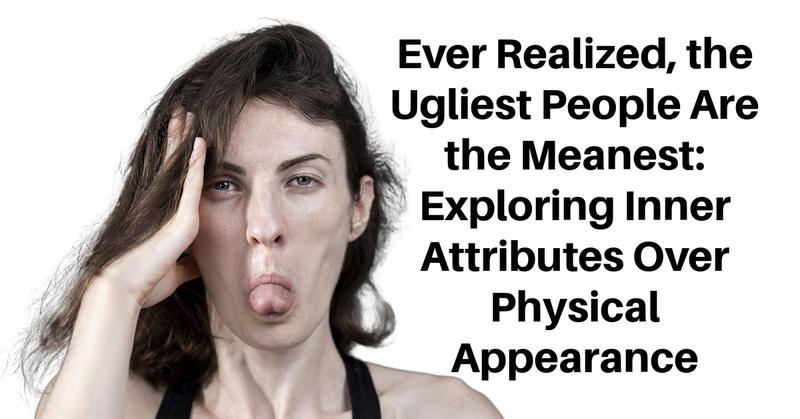Ever Realized, the Ugliest People Are the Meanest Exploring Inner Attributes Over Physical Appearance
Ever Realized, the Ugliest People Are the Meanest Exploring Inner Attributes Over Physical Appearance
We've all heard the age-old adage, "Don't judge a book by its cover." While it's easy to say, human nature often tends to gravitate toward appearances. But what if I were to tell you that the phrase holds more truth than meets the eye? Indeed, many would argue that the ugliest people are often the meanest, not referring to their physical attributes, but rather their inner qualities. Psychology offers us intriguing insights into this phenomenon, shedding light on the intricate connection between behavior and personality.
Understanding the Facade of Mean Behavior:
The concept of "ugliness" here isn't about physical appearance, but rather the behavior and attitudes that we consider unattractive. People who exhibit mean behavior tend to show traits such as selfishness, rudeness, cruelty, and a lack of empathy. They may use sarcasm, insults, or condescending remarks, and they often seem to enjoy putting others down. However, it's crucial to note that this behavior isn't always an accurate representation of their inner selves. Often, it's a defense mechanism or a coping mechanism that masks deeper psychological issues.
The Role of Insecurity:
Many individuals who project mean behavior onto others might be dealing with underlying insecurities. Insecurity can stem from various sources, such as childhood experiences, past failures, or a general lack of self-confidence. The mean attitude becomes a way to deflect attention from their vulnerabilities. By focusing on others' perceived flaws or shortcomings, they divert attention away from their own fears and inadequacies.
The Empowerment Illusion:
For some, being mean can create a false sense of empowerment. In a world that can often feel overwhelming, asserting dominance through mean behavior can provide a sense of control. Such individuals might feel that by belittling others, they are elevating themselves. This distorted perspective gives them a short-lived feeling of superiority, even if it's at the expense of others' emotional well-being.
The Defense Mechanism of Projection:
Psychologically speaking, the concept of projection comes into play here. Projection is a defense mechanism where individuals attribute their own unwanted or negative feelings, thoughts, or traits onto someone else. In the context of mean behavior, a person projecting their own inner negativity might lash out at others, accusing them of being the source of the negativity they themselves are feeling. This phenomenon allows them to avoid confronting their own issues and provides a justification for their actions.
The Cycle of Reinforcement:
Mean behavior can also be reinforced by the reactions it elicits from others. When individuals witness or experience someone being mean, they often react emotionally, either with frustration, anger, or sadness. This reaction can give the perpetrator a twisted sense of satisfaction or power, further encouraging the continuation of this behavior. The cycle perpetuates itself as mean individuals receive attention and responses, albeit negative ones, that feed their need for validation.
Breaking the Pattern:
Understanding that mean behavior often masks deeper psychological issues doesn't excuse the harm it can cause. Compassion and empathy should always be extended to those who are struggling, even if they present a tough exterior. For those dealing with mean behavior within themselves, seeking professional help can lead to a deeper understanding of the underlying causes and the development of healthier coping mechanisms.
The notion that the ugliest people are the meanest goes beyond physical attributes. It dips into the complex interplay of psychology, personal history, and defense mechanisms. By recognizing that mean behavior often arises from insecurities, projection, and a distorted sense of empowerment, we can foster a more empathetic and understanding society. Just as no book should be judged solely by its cover, no person should be judged solely by their outward behavior.
Be the first to post a message!
